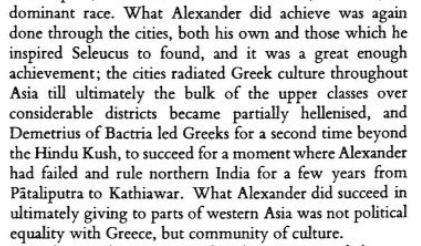Quote:
“Through
both his parents claimed Greek descend...”
page 1
Quote:
“The primary reason why Alexander invaded
Persia was, no doubt,
that he never thought of not doing it; it was his inheritance. Doubtless,
too, adventure attracted
him; and weight must also be
given to the official reason. For
officially, as is
shown by the
political manifesto which
he afterwards sent to Darius from Marathus (p.36), the invasion was that Pan-hellenic war of revenge which Isocrates had
preached; and Alexander
did set out with pan-hellenic ideas:
he was the champion of Hellas. It seems quite certain that
he had read, and was influenced
by, Isocrates Philippus.”
pages 8-9
Quote:
“Generally speaking, the League infantry was used mainly
for garrisons and communications;
but the Cretan archers, who
were not League troops, were as indispensable
as the Agrianians themselves, and
their loss of five commanders successively shows how heavily they were
engaged.”
page 10
Quote:
“Besides the Staff, Alexander
had about him a body of men of
high position to whom the name Companions properly belongs, number
unknown,…They included his personal
friends… Nearchus; …and a few
Greeks like Demaratus,
Stasanor and Laomedon,… as a civilian.”
page 12
“Besides his Macedonian generals,
Alexander had with him a number of Greek
technicians, of whom too little is known
… seaman,… before Bactra”.
pages 12-13
“That Asia was not more hellenised than
it was arose simply from there
not being enough Greeks in the world. They
had to be collected into comparatively few towns;…”
page 134
Quote:
“Most
of what we know about
Alexander’s towns relates to Alexandria
by Egypt, and there it is impossible to
distinguish what is original and what not; but the type was doubtless due to
Alexander, for Ptolemy I’s foundation Ptolemais was an autonomous Greek city.”
page 134
Quote:
“What
Alexander did achieve
was again done through the cities, both
his own and
those which he inspired Seleucus
to found, and it was a great enough achievement; the cities radiated Greek
culture throughout Asia till ultimately the bulk of the upper classes over
considerable districts became partially hellenised, and Demetrius of
Bactria led Greeks for a second time beyond the Hindu Kush, to succeed for a moment where Alexander had failed and
rule northern India for a few years from Pataliputra to
Kathiawar.”
page 138
Alexander
the Great,by Tarn, W. W. (William Woodthorpe), 1869-1957
Sir William
Woodthorpe Tarn (1869-1957) was a British ancient historian who wrote numerous
works on the Hellenistic world. Tarn's Alexander the Great, first published in
two volumes during 1948, has become a classic text and its importance for
subsequent Alexander studies can hardly be exaggerated. Based on a lifetime's
work and elegantly and persuasively written, both volumes evoked immediate
admiration - and very soon sharp reaction. Volume I presents a 'comependious'
narrative of Alexander's life and achievements; volume II focuses on providing
a detailed analysis of sources and discussion relating to key historical
cruces. This is a fascinating work that will be of value to anyone with an
interest in the writings of Tarn, ancient history and Alexander the Great.
from back cover



.jpg)


.jpg)










.png)





.jpg)




















